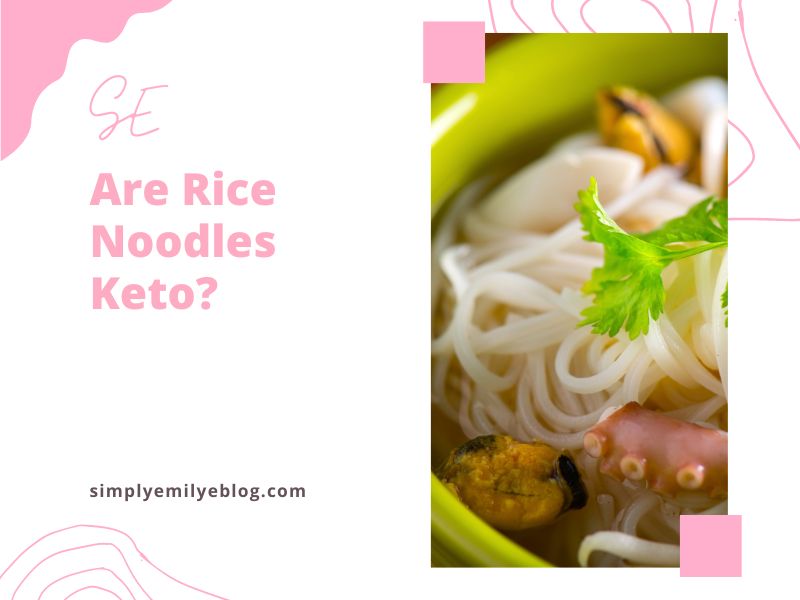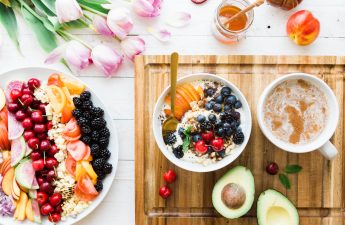I’ll admit, when it comes to the keto diet, the question of whether rice noodles are keto-friendly can be a bit perplexing. After all, rice is a staple in many Asian cuisines, and rice noodles are a popular ingredient in dishes like Pad Thai and pho. So, are rice noodles keto? Let’s dive into the topic and find out.
- The Basics of the Keto Diet
- Rice Noodles and Carb Content
- Alternatives for Keto-Friendly Noodles
- Keep Track of Your Macros
- Variety and Balance in Your Keto Journey
- The Importance of Carb Awareness
- Incorporating Nutrient-Dense Ingredients
- Embracing Flexibility and Adaptability
- What are rice noodles?
- Are rice noodles keto?
- What is the carb content of rice noodles?
- Are there any keto-friendly alternatives to rice noodles?
- Is there any way to make rice noodles keto-friendly?
- What are some other keto-friendly noodle alternatives?
- Is it possible to make “rice-style” noodles with other ingredients?
- What are the nutritional benefits of eating rice noodles?
- Are there any health benefits to eating rice noodles?
- Are there any special recipes for making keto-friendly rice noodles?
The Basics of the Keto Diet
Before we tackle rice noodles specifically, let’s quickly recap what the keto diet is all about. The ketogenic diet is a low-carbohydrate, high-fat eating plan that aims to put your body into a metabolic state called ketosis. In ketosis, your body switches from using carbohydrates as its primary fuel source to burning fat for energy. To achieve this, the keto diet typically limits carb intake to around 20-50 grams per day, depending on individual needs.
Rice noodles are not considered keto-friendly, as they are a higher-carb food. They have 12-13 grams of net carbs per 100 grams, so are not suitable for a low-carb, ketogenic diet.
Rice Noodles and Carb Content
Now, let’s talk about rice noodles. Rice noodles, as the name suggests, are made primarily from rice flour. Unfortunately, rice is relatively high in carbohydrates, which raises concerns for those on a keto diet. A 1-cup (160g) serving of cooked rice noodles contains around 44 grams of net carbs*. Considering the limited carb allowance on keto, this amount can quickly eat up a significant portion of your daily allowance.
| Rice Noodles (1 cup, cooked) | Net Carbs |
|---|---|
| Total Carbs | 52g |
| Fiber | 1g |
| Net Carbs | 51g |
Alternatives for Keto-Friendly Noodles
While traditional rice noodles may not be keto-friendly due to their high carb content, fear not! There are plenty of low-carb noodle alternatives that you can enjoy while staying on track with your keto goals. Here are a few options:
- Shirataki Noodles: Made from konjac flour, shirataki noodles are incredibly low in carbs and calories. A 1-cup serving of shirataki noodles contains less than 1 gram of net carbs.
- Zucchini Noodles (Zoodles): Spiralized zucchini makes a fantastic noodle substitute. Zoodles are low in carbs and provide a good dose of fiber and nutrients. Plus, they’re versatile and can be used in various dishes.
- Spaghetti Squash: When cooked, spaghetti squash yields long, noodle-like strands that can be a tasty alternative. It’s relatively low in carbs and provides some essential vitamins and minerals.
- Kelp Noodles: Made from seaweed, kelp noodles are another low-carb option. They have a crunchy texture and are virtually calorie-free, making them a great choice for keto-friendly meals.
Remember to be mindful of portion sizes and incorporate these alternatives into your meals in moderation to maintain ketosis.
Keep Track of Your Macros
While exploring alternative noodle options, it’s essential to keep track of your macros. Maintaining a proper balance of macronutrients (carbohydrates, fats, and proteins) is crucial on the keto diet. By monitoring your intake, you can ensure you stay within your daily carb limit and maintain ketosis effectively. If you wondered if peach cobbler need to be refrigerated, we got you!
Tracking apps or online tools can help you keep a record of your meals and calculate the nutritional values of the ingredients you use. This way, you can make informed decisions and maintain control over your carbohydrate intake.
Variety and Balance in Your Keto Journey
The keto diet doesn’t have to be monotonous or restrictive. With a little creativity and exploration, you can enjoy a wide range of flavorful and satisfying meals while staying true to your keto goals. Incorporating different low-carb noodle alternatives into your diet is just one example of how you can add variety and balance to your meals.
Remember, the keto diet is a long-term lifestyle choice for many individuals. It’s crucial to approach it in a way that is sustainable and enjoyable for you. Don’t be afraid to try new recipes, even with jalapenos, experiment with different ingredients, and discover what works best for your taste buds and dietary needs.
Consult with a Healthcare Professional
As always, if you have any specific health concerns or conditions, it’s advisable to consult with a healthcare professional, such as a registered dietitian or nutritionist, before making significant changes to your diet. They can provide personalized guidance and support to help you navigate the keto diet safely and effectively.
The Importance of Carb Awareness
Being mindful of carbohydrate content is crucial on the keto diet. Since the primary goal is to keep your body in ketosis, where it burns fat for fuel, monitoring your carb intake becomes a priority. It’s not just about avoiding high-carb foods like rice noodles; you’ll also need to be aware of hidden carbs in sauces, condiments, and processed foods. Reading nutrition labels and familiarizing yourself with the carb content of different ingredients can help you make informed choices and stay on track.
Balancing Macronutrients
While carbs are limited on the keto diet, it’s important to maintain a balance of macronutrients. This means ensuring you’re getting an adequate amount of healthy fats and an appropriate amount of protein. Fats provide energy and help keep you feeling satiated, while protein supports muscle growth and repair. Finding the right balance for your individual needs is essential for overall well-being and success on the keto diet.
The Power of Portion Control
Portion control plays a significant role in maintaining ketosis. Even with low-carb alternatives like zucchini noodles or shirataki noodles, it’s important to moderate your portion sizes. While these options are lower in carbs than rice noodles, overindulging can still impact your carb intake.
- Pay attention to your body’s hunger and fullness cues, and practice mindful eating to avoid consuming excessive amounts of any food, including keto-friendly noodles.
Incorporating Nutrient-Dense Ingredients
To optimize your health while following a keto lifestyle, focus on incorporating nutrient-dense ingredients into your meals. While noodles can be a satisfying part of a dish, don’t forget to pair them with other nutritious elements. For example, adding a variety of colorful vegetables, lean proteins, and healthy fats like avocado or olive oil (but not a bacon) can enhance the nutritional value of your meal and provide a range of essential vitamins and minerals.
The Role of Hydration
Staying hydrated is crucial for overall health and well-being, and it’s especially important when following a keto diet. As your body adjusts to burning fat for fuel, it releases water and electrolytes. To maintain proper hydration, be sure to drink plenty of water throughout the day and consider incorporating electrolyte-rich beverages or supplements. Staying hydrated can help prevent keto flu symptoms, such as fatigue, dizziness, and headaches.
Navigating Dining Out
Following a keto diet doesn’t mean you have to miss out on dining out or socializing with friends and family. With a bit of preparation and awareness, you can still enjoy restaurant meals while staying keto-friendly. When ordering, opt for dishes with keto-friendly protein sources, such as grilled meats or seafood, and ask for substitutions like extra vegetables instead of carb-heavy sides. Don’t hesitate to inquire about ingredient lists or cooking methods to ensure your meal aligns with your dietary goals.
Embracing Flexibility and Adaptability
Lastly, remember that the keto diet is not a one-size-fits-all approach. It’s essential to listen to your body, monitor your progress, and adjust your approach as needed. Your needs may change over time, and that’s okay. Stay open to modifications and adaptations that suit your lifestyle and preferences. The goal is to find a sustainable way of eating that supports your health and well-being in the long run.
In conclusion, while traditional rice noodles are not suitable for the keto diet due to their high carbohydrate content, there are numerous low-carb alternatives available. By exploring options like shirataki noodles, zucchini noodles, spaghetti squash, and kelp noodles, you can enjoy satisfying noodle dishes while maintaining ketosis.
Remember to stay mindful of your overall macronutrient balance, portion sizes, and the nutritional value of your meals. With a bit of creativity, awareness, and adaptability, you can successfully navigate the keto journey and achieve your health and wellness goals.
What are rice noodles?
Rice noodles are noodles or pasta made from rice flour or starch, which are widely used in Asian cuisine. They come in various shapes and sizes, from thin vermicelli to wide, flat noodles, and are usually semi-transparent.
Are rice noodles keto?
Rice noodles are not considered keto-friendly, as they are a higher-carb food. They have 12-13 grams of net carbs per 100 grams, so are not suitable for a low-carb, ketogenic diet.
What is the carb content of rice noodles?
Rice noodles contain 12-13 grams of net carbs per 100 grams.
Are there any keto-friendly alternatives to rice noodles?
Yes, there are keto-friendly alternatives such as shirataki, konjac, or kelp noodles that are low-carb and provide a similar texture to rice noodles.
Is there any way to make rice noodles keto-friendly?
Although it is possible to make rice noodles more keto-friendly by cutting back on the amount you eat, rice noodles are still a higher-carb food and should be avoided on a ketogenic diet if you want to stay in ketosis.
What are some other keto-friendly noodle alternatives?
Other low-carb, keto-friendly noodle alternatives are shirataki, konjac, kelp, and zoodles (zucchini noodles). Have you wondering does Wendy’s have coffee, the answer is simple – yes!
Is it possible to make “rice-style” noodles with other ingredients?
Yes, it is possible to make “rice-style” noodles with other ingredients such as almonds, coconut, and cauliflower. These “rice-style” alternatives may be suitable for a low-carb, ketogenic diet.
What are the nutritional benefits of eating rice noodles?
Rice noodles are a good source of carbohydrates, providing energy and some essential vitamins and minerals, such as iron, folate, and B vitamins.
Are there any health benefits to eating rice noodles?
Rice noodles may help to regulate blood sugar levels, as they are low glycemic, meaning they are digested and absorbed slowly. They are also a good source of protein, although it is not as high as other plant-based sources.
Are there any special recipes for making keto-friendly rice noodles?
Yes, there are recipes for making keto-friendly rice noodles using ingredients such as almond flour or coconut flour. These recipes can help you enjoy the texture of rice noodles without the higher carb content.




